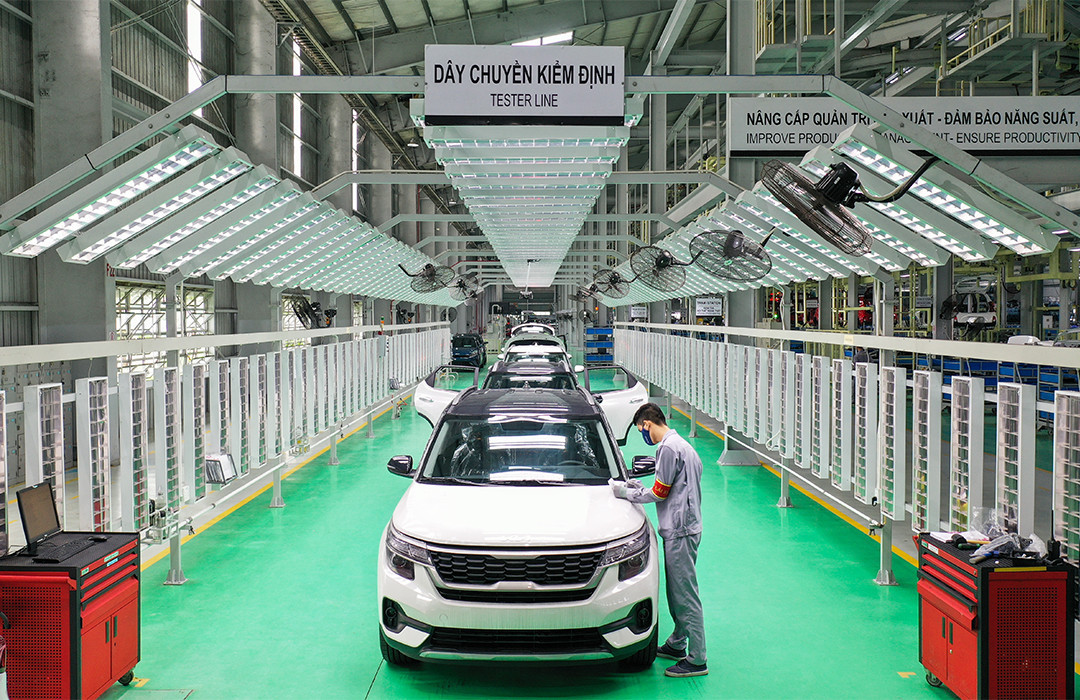
After 40 years of doi moi (renovation) and 30 years since the Law on Private Enterprises and Company, Vietnam now has 900,000 enterprises, including large economic groups with international stature, and many dollar billionaires.
However, the number of enterprises remains low (9 per 1,000 people), while the majority are small and medium scale, with weak competitiveness.
Domestic private enterprises cannot be compared with foreign invested enterprises in both competitiveness in the market and global integration. There has not been a strong rise of rich businesspeople as expected by policymakers who compiled the Law on Enterprises three decades ago.
The determination to expand operating scale and promote the stature of Vietnamese enterprises was included in Resolution 41 on developing a contingent of new-era businesses released in October 2023.
The resolution stressed that Vietnamese businesspeople are one of the core forces contributing to the promotion of industrialization, modernization and international integration; and can help develop an independent and self-reliant economy, ensuring national defense and security.
Particularly, the resolution emphasized the need for groundbreaking policies to form nationalized enterprises, with large-scale cooperation in some key business fields.
The resolution affirms the importance of institutional regime. The state is likened to a designer and creator of a clear, transparent and convenient environment for businesses to operate. The more enterprises that appear in the market and the more goods that are supplied, the more developed trade will be.
“To nurture domestic manufacturing enterprises, policies need to be transparent and predictable, designed in a way to protect domestic production. Reasonable policies are exactly what enterprises want, not money,” said Hoa Phat president Tran Dinh Long.
All countries have set up technical barriers to restrict imports and protect domestic production. If Vietnam doesn’t take similar action, domestic products will continue to bear pressure from imports.
Stressing that Vietnam needs to have large corporations leading the national economy, Long said it is necessary to learn from South Korea and China and create specific policies for Vietnam.
Thaco Truong Hai president Tran Ba Duong said the automobile manufacturer has earned $140 million from exports so far this year and another $20 million from sales to FIEs (foreign invested enterprises).
In automobile manufacturing alone, Thaco has contracts on selling car parts to Hyundai, Ford, Toyota and Isuzu, worth $13 million.
Multinationals choose Vietnam to assemble cars for export, and Vietnamese enterprises can make 35-40 percent of car parts for them. Thaco plans to double the output of support industry products in 2025 by developing a mechanical engineering complex in the south.
Thaco hopes there will be stronger policies to protect domestic production.
Duong noted that while support industries are becoming increasingly important in many fields, Vietnam still doesn’t have clear strategies to develop the mechanical engineering sector.
“We strongly believe that the next strategic steps Vietnam needs to take is boosting exports in both quantity and quality, and increasing the value of Vietnam’s export items,” said Masan’s deputy CEO Nguyen Thieu Nam.
The question is how to help Vietnam’s enterprises build strong brands of an international stature.
According to Nam, international cooperation is essential to improve techniques and more deeply join the international market. He hopes the government will create favorable conditions so that Masan can contact large mining groups that have core technologies.
To encourage enterprises to make investments in deep processing and develop a processing industry into a key heavy industry, the government should not tax deeply processed products from minerals.
Regarding the export of consumer goods, the representative from Masan proposed that the government set a roadmap and plan to encourage enterprises to reach out to the world, popularize Vietnamese cuisine, and build strong national culinary brands.
International organizations place Vietnam in the fifth position on the list of 10 countries with most attractive food in the world. This shows that Vietnamese food is original with specific characteristics.
Also, an information portal with standards for trade promotion techniques of other countries can help Vietnamese exporters learn about when to export their products.
Ngoc Ha - Phan Chi Hieu - Tam An - Luong Bang